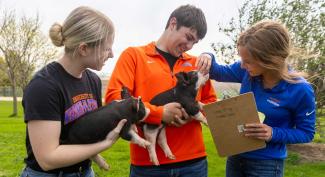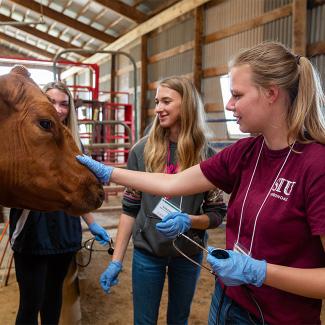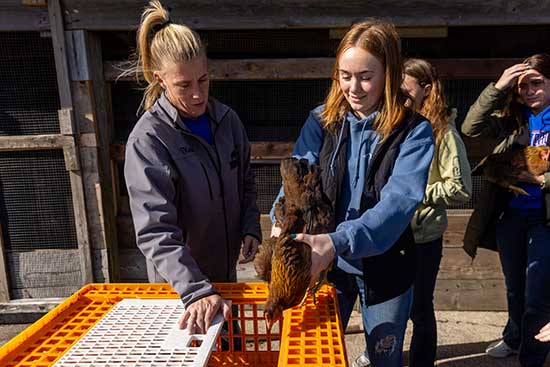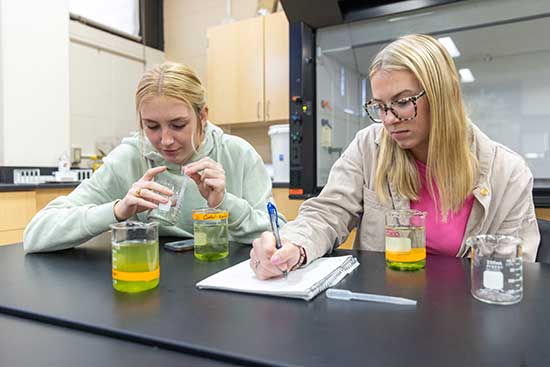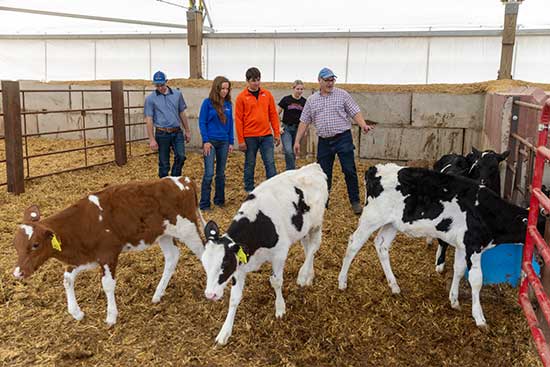What you'll learn studying Pre-veterinary Medicine at UW-Platteville
Veterinary medicine applies modern medical science to the care of animals. The study of veterinary medicine is concerned with gaining a thorough knowledge of the fundamental biological and physical sciences relating to animal functions.
In the Pre-Veterinary program at the University of Wisconsin-Platteville, your coursework will focus on animal science. You will learn about topics that include the anatomy and physiology of domestic animals; animal nutrition; animal health and welfare; and the reproductive processes in domestic animals. You will also have exciting opportunities to learn through class discussions, labs, and a capstone project, which can be an internship, study abroad, undergraduate research, or field experience.
The Pre-Veterinary program at UW-Platteville consists of selected pre-vet courses designed to prepare you to apply to a four-year veterinary program that culminates in the awarding of a doctorate in veterinary medicine. Veterinary school is an additional four years of education after your undergraduate preparation. More information about veterinary school can be found at the American Association of Veterinary Medical Colleges.
Accelerated degree program
The UW-Platteville 3+1 Program provides an option to save time and money earning your bachelor’s degree. If you apply to veterinary school and are accepted before finishing the requirements for the Bachelor of Science in Animal Science at UW-Platteville, you may transfer your first year of veterinary school courses back to UW-Platteville to complete your bachelor’s degree.
You are eligible for the 3+1 Program if you complete your veterinary school admission requirements, as well as your general education courses, and sufficient courses in the animal science major by the end of your third year at UW-Platteville.
This program does not grant admission to veterinary school. You must independently apply and be accepted by an accredited veterinary program and complete the first year of veterinary school to be eligible for this program.
Food animal veterinary medicine scholars
Our students are also eligible to participate in the Food Animal Veterinary Medicine Scholars (FAVeMedS) Program, an early-decision program from UW-Madison School of Veterinary Medicine. Admission will be based on the following:
- Complete one year of full-time (at least 12 credits per semester) undergraduate studies at the University of Wisconsin at either Madison, Platteville, or River Falls.
- Minimum first-year undergraduate cumulative GPA of 3.25 with at least one-half of the credits coming from courses in biological sciences, genetics, chemistry, physics, or mathematics.
- Minimum score of 25 on the college entrance ACT exam (or 1230 on the SAT exam, based on the tri-partite exam’s 1600-point scale).
- Strong and documentable interest in veterinary medicine, and specifically, in food animal aspects of the profession. Get more information about Food Animal Veterinary Medicine Scholars.
Careers in Veterinary Medicine
Veterinary professionals work closely with animals, diagnosing, treating, preventing, and researching medical conditions. While some veterinarians focus on helping domestic animals such as cats, dogs, rabbits, and other small household pets, others focus their practices on livestock, helping farmers and ranchers keep their animals healthy.
Regardless of what type or size animals they work with, veterinarians examine animals, treat wounds, provide vaccinations, test for diseases, perform surgeries, prescribe medications, euthanize animals, and advise animals’ owners about providing appropriate care.
Colleges with vet programs prepare students for a variety of roles. Some of the most popular careers for veterinary program graduates include:
- Animal researcher
- Companion animal veterinarian
- Food animal veterinarian
- Food safety and inspection veterinarian
- Laboratory animal caretaker
- Veterinary assistant
- Veterinary technician
- Zoologist/wildlife biologist
People who choose to work in the field of veterinary medicine may work primarily in offices or laboratories, but they may also make house calls to care for animals. Veterinarians who work with livestock will often treat animals on location at farms and ranches. Career opportunities include roles in private practice as well as in corporate veterinary medicine and government agencies.

More than Memorization
At UW-Platteville, students enrolled in veterinary courses learn both inside and outside of the classroom. Experiential learning takes place through internships, university events, and research opportunities.
Pre-Veterinary Program Frequently Asked Questions
What is the pre-veterinary program?
The Pre-Veterinary program is designed to prepare students for application to veterinary school at an American Veterinary Medical Association accredited school while completing their bachelor’s degree. More information about veterinary school can be found at www.aavmc.org and www.applytovetschool.org. Veterinary school is an additional four years of education after your undergraduate preparation.
What courses can I take in high school to prepare?
Veterinary school admission usually requires multiple chemistry, biology, and physics courses. In addition, most schools have math, English, and humanities requirements. We recommend taking as many math, English, and science courses while in high school as possible. We also recommend job shadowing at one or more veterinary clinics to see if this is a career path for you.
How many years is the Pre-Veterinary program at UW-Platteville?
That depends on many factors. Typically, most students will apply to veterinary school during their fourth year. However, depending on prior college credits, course load, and placement scores, this can be earlier or later. The main factor will be completing the required courses set by the veterinary schools you are applying to. More information about required courses for veterinary school can be found at www.aavmc.org.
What is the 3+1 Program?
The UW-Platteville 3+1 Program is available for students who complete their veterinary admission requirements, general education courses, and sufficient courses in the animal science major by the end of their third year at UW-Platteville. If the student applies to veterinary school and is accepted before finishing the requirements for their animal science B.S. degree, the student may transfer their first year of veterinary courses back to UW-Platteville to complete their animal science degree. This program does not grant admission to veterinary school. The student must independently apply and be accepted by an accredited veterinary program and complete their first year of veterinary school to be eligible.
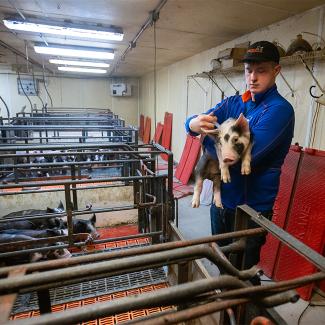
Doctor of Veterinary Medicine Pathway
Turn your passion for animals into a veterinary career. Through this pathway, you’ll complete three years of Animal Science coursework at UW–Platteville, then apply your first year at any AVMA-accredited veterinary college toward your bachelor’s degree—earning your B.S. in Animal Science while getting a head start on your Doctor of Veterinary Medicine (DVM).
Contact soa@uwplatt.edu to learn more.
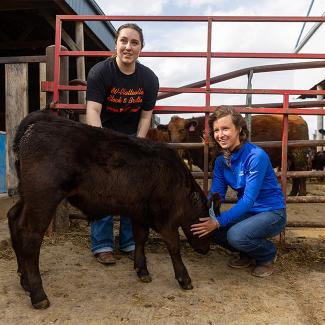
Veterinary Technician and Animal Science Dual Pathway
Through this collaborative program, Madison College and UW–Platteville students can combine their studies to efficiently earn credentials in veterinary care. Veterinary Technician coursework at Madison College can apply toward a B.S. in Animal Science at UW–Platteville, and UW–Platteville students may also earn a Veterinary Technician associate degree at Madison College, providing a flexible, time-saving pathway.
Learn more by contacting soa@uwplatt.edu.
